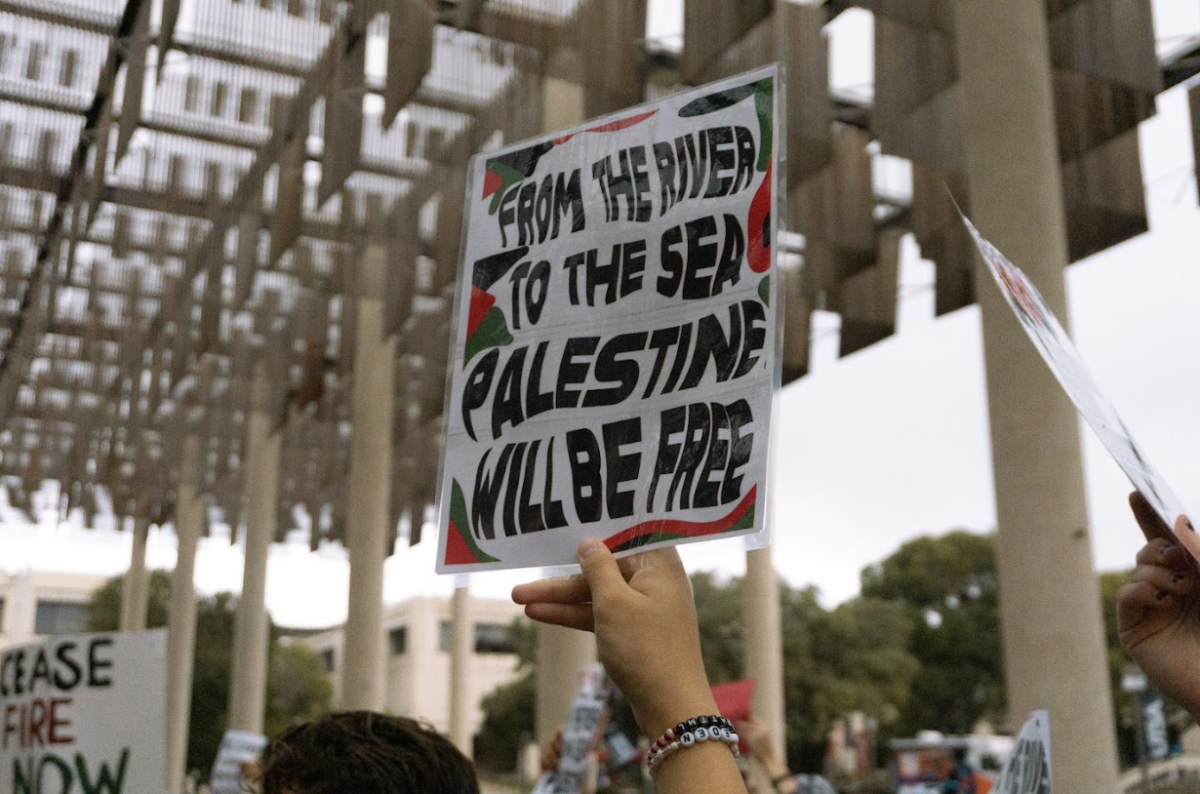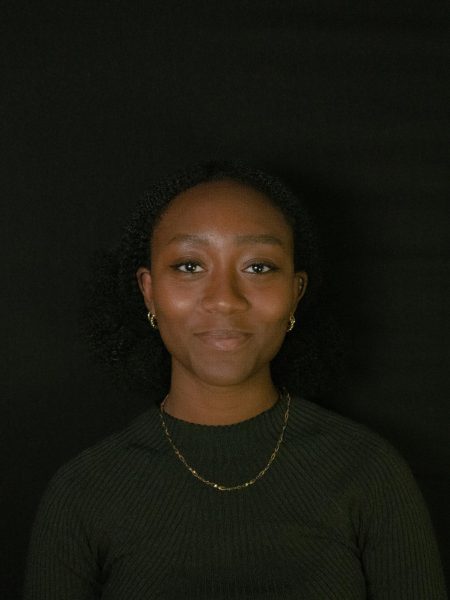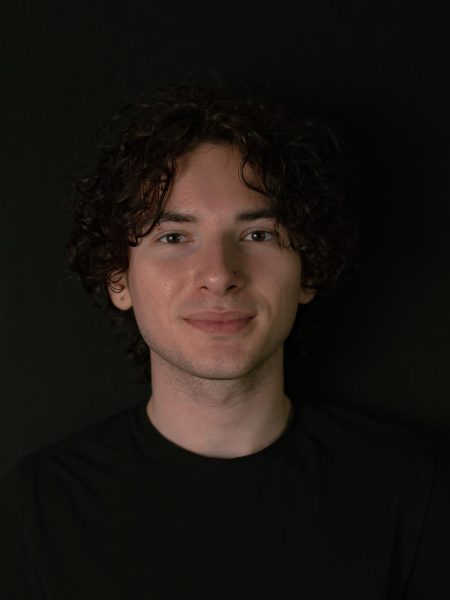At noon on Nov. 9, more than 100 students assembled in the Sombrilla to stand in solidarity with Palestinians affected by the Israel-Hamas war.
Students in support of Palestine organized their own “Shut It Down For Palestine” event and walked out of classes to gather and advocate under the Sombrilla. The walkout was inspired by the International Shutdown for Palestine, a decentralized, coordinated event assembled by the Palestinian Youth Movement and other activist groups. The gathering at UTSA was one of many across the nation that were held in response to the ongoing war in the Gaza Strip since the Oct. 7 attacks.
The event drew a large crowd, with passersby listening from the surrounding area. Organizers handed out flyers and pamphlets informing readers about the conflict from the Palestinian perspective, most prominently about the federal government’s involvement in funding Israel’s military effort. The pamphlets detailed how San Antonians’ millions of federal tax dollars could have instead been put to use in local housing, healthcare and education.
Batool Rizvi, one of the organizers of the event, says that the Middle Eastern and Palestinian communities in San Antonio are also affected by Mayor Nirenberg’s ‘friendship pact’ with Israel, citing San Antonio as a “sister city” with Tel Aviv. Allied group, San Antonio Justice for Palestine, has pleaded every Wednesday to the mayor to back out of the pact, which he refuses to do. Governor Greg Abbott also urged schools across Texas to provide informational material and teach the history of the conflict, supporting the Israeli perspective.
Rizvi emphasized that the walk-out was a student-led effort to counteract the “helpless” feeling and misinformation surrounding the issue.
“We’re just trying to tell people; we’re just asking for a ceasefire. Stop all the senseless killing, the violence, you know. There’s a lot of children being killed. It’s very encouraging to see people see that this is an urgent humanitarian cause and we need to address it,” Rizvi said.
Under the Sombrilla, the crowd responded to the speakers’ many calls: “What do we want? Ceasefire! When do we want it? Now!”; “Biden, Biden, you can’t hide, we charge you with genocide!”; “From the river to the sea, Palestine will be free,” and more.
A speaker paused in the chanting to teach Palestine’s history. Students sat and called back important dates and events as they were mentioned.
“So, if people try to argue with you about the occupation in Palestine, you will now have the facts,” Kira Sutter, the speaker, said.
Pro-Palestinian calls and responses resumed, followed by speeches sharing their sympathies with Gazans. Speakers expressed their grievances with UTSA for not allowing them to use microphones, crying out, “Shame on UTSA! Let us amplify our voices! Sorry genocide bothers you!”
The sensitive topic of the gathering brought out high emotions and attention from students and faculty alike. Some were worried that it would escalate to violence, as seen in protests at other universities. Others were moved by the effort, such as Dr. Jennifer Alexander, a Public Administration and Policy professor who knew students and colleagues affected by the problem.
“People aren’t just victims and just perpetrators; they’re both,” Dr. Alexander remarked. “For me, growing up in a different time, it’s good to see people care. I had several students from the West Bank; they were PhD students, and I think about where they are right now. I have a very good friend who is Lebanese, who’s a director in a school of public policy, and I didn’t realize until what was happening lately that when he was growing up, he was listening to these F-16 bombs. It’s just a very tragic situation.”
The Dean of Students, LT Robinson, shared her thoughts about the gathering.
“It’s really important to me that students know and understand their right to free speech,” she said. “I see the work that the students are doing here today, and I’d like to encourage our students to continue with that spirit as they explore what’s happening in the world, continue to learn more, use their critical thinking skills and learn as much as possible so they can make informed decisions and have opinions that are well informed.”
During the hour and a half of the sit-in, the crowd got up twice to walk around the main plaza. Classrooms and student organizations tabling along the Paseo Principal looked on as allies marched and chanted.
Students for Justice in Palestine at UTSA, or SJP, claimed they were banned from tabling last semester and do not know why. The group felt the university was attempting to “censor” them with subtle “red-taping” efforts since they were allegedly not allowed to make reservations for rooms and did not receive much support.
This semester, SJP tables every Tuesday and Thursday under the Youth Democratic Socialists of America (YDSA) chapter on campus. The group shared that they have been getting positive engagement from the student body, except for a few pro-Israel students. A student from Chi Alpha shared their position on the matter: “I’m pro-Israel. I’m not honestly a whole lot educated on everything, but it is something I would like to [look] more into. I’m a believer, I love Jesus, [and] I know Israel is God’s people, so I don’t know how that necessarily affects everything.”
Following the walkout and sit-in at the Sombrilla, the Muslim Student Association collaborated with YDSA, SJP and the San Antonio Party for Socialism and Liberation to host a screening of “Born in Gaza,” a documentary about the effects of the conflict on the Gazan children.
On Oct. 12, UTSA shared a message following the Oct. 7 attacks, offering support and guidance to the community.
According to shutitdown4palestine.org, another international protest is planned for Nov. 17.









